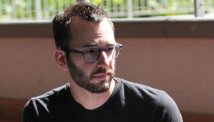By Samuel Moncada, Special to CNN
February 18, 2013 -- Updated 1218 GMT (2018 HKT)
One Venezuelan official says the reforms enacted in Hugo Chavez's 14-year tenure deserve respect.
STORY HIGHLIGHTS
- Despite perceptions, Hugo Chavez has brought social progress to Venezuela
- Moncada: Venezuela's critics have engineered a false narrative of impending disaster
- Venezuela has used its vast oil reserves to transform lives of ordinary people
- Ambassador says Chavez's most significant achievement is his empowerment of the majority
Editor's note: Samuel Moncada has been the Ambassador of Venezuela to the United Kingdom since 2007 and holds a PhD in Modern History from Oxford University. He is solely responsible for the content of this analysis.
(CNN) -- Reading the international press, one would be forgiven for thinking that Venezuela is on the verge of collapse.
Over the past decade, all sorts of predictions have been made, ranging from catastrophic election defeats to the implosion of the Venezuelan economy. But the fact these predictions have failed to materialize has not deterred many of Venezuela's most fervent critics in their quest to engineer a constant and misleading narrative of impending disaster.
More: Chavez returns after Cuba cancer treatment
The reality is that ever since President Hugo Chavez was first elected, Venezuela has defied these negative predictions and brought unprecedented social progress to the country over the last 14 years. Since 2004 poverty has been reduced by half and extreme poverty has been cut by 70%. University enrolment has doubled, entitlement to public pensions has tripled, and access to health care and all levels of education have been dramatically expanded.
Venezuela now has the lowest levels of economic inequality of any Latin American country as measured by the Gini coefficient. Our country has already achieved many of the Millennium Development Goals, and is well on target to achieve all eight by the 2015 deadline.
This progress has been achieved by using Venezuela's vast oil revenues to transform the lives of ordinary people. The sheer scale of our oil reserves -- the world's largest -- guarantees the complete sustainability of the model in which the country's resources are used to stimulate growth in the economy and aid development.
But Chavez's most significant achievement has been to trigger the awakening and empowerment of the majority. A majority of Venezuelans have seen vast improvements in their living standards and, as a consequence, they have continued to defend their interests at the ballot box.
The Venezuelan people are very clear about what they want. President Chavez was re-elected in October 2012 with 54% of the vote in an election that boasted an 81% turnout. The Venezuelan people showed their support for the government again in December 2012 in the gubernatorial elections, which saw Chavez's political party win 20 out of 23 states.
Governments in Europe and other parts of the world could only dream of these levels of support after 14 years in power. This shows that social progress in Venezuela has been consolidated and that there is a desire to further expand this progress.
In the coming years, the Venezuelan government will continue to respond to the needs of the Venezuelan people. Hundreds of thousands of new homes have been built over the last two years which have not only greatly improved living standards but also provided jobs and contributed to a boom in the construction industry. The government is well on its way to meeting its target of building three million new homes by 2019.
While many economies around the world are shrinking, the Venezuelan economy grew by 5.5% in 2012. Against the backdrop of a continuing international financial crisis, commerce in Venezuela grew by 9.2% and communications by 7.2%, manufacturing grew by 2.1% and the oil sector grew by 1.4% -- making Venezuela one of the fastest growing economies in Latin America.
At a time when many countries are attacking the rights of the most vulnerable sectors of society, Venezuela is providing ever greater protection for low-income senior citizens and single-parent families with younger children or disabled dependents.
The failed development models of previous governments condemned millions of Venezuelans to poverty. Before the election of Chavez in 1998, Venezuela suffered years of falling GDP. The country had one of the worst economic records in the world -- a record that led to mass social unrest and violent military crackdowns.
Venezuela will continue on its path of social progress and empowering ordinary citizens. The greatest hope for the future is the people know that they alone hold the power to determine the direction the country will take.
After so many failed predictions, isn't it time to respect Venezuela's democracy and the will of the people?
Part of complete coverage on
February 18, 2013 -- Updated 1218 GMT (2018 HKT)
President Hugo Chavez has used the nation's vast oil reserves to transform the lives of ordinary people, one official says.
February 19, 2013 -- Updated 0546 GMT (1346 HKT)
New America Foundation's Steven Clemons talks about the significance of China's new port in Pakistan.
February 19, 2013 -- Updated 1015 GMT (1815 HKT)
He declared last summer to be a "dream come true." Now Oscar Pistorius has entered what could be one of the darkest periods of his life.
February 18, 2013 -- Updated 1525 GMT (2325 HKT)
The public are still being left in the dark about the brutal treatment and needless suffering of the horses destined for their plates.
February 18, 2013 -- Updated 0235 GMT (1035 HKT)
Lebanese women demand laws to protect them against domestic violence. But local religious courts claim this is a matter of "personal status."
February 18, 2013 -- Updated 1453 GMT (2253 HKT)
Lennon's killer, Mark David Chapman wrote letters to the police officer who arrested him, asking him repeatedly to read "The Catcher in the Rye."
February 18, 2013 -- Updated 1038 GMT (1838 HKT)
It's a battle for the airports in northern Syria, with rebels closing in. CNN's Nick Paton Walsh reports.
February 18, 2013 -- Updated 1409 GMT (2209 HKT)
Media reports have described him as a man who hanged himself in an Israeli prison. But details about what happened to him, and why, remain elusive.
February 18, 2013 -- Updated 0028 GMT (0828 HKT)
Cameron Russell says her looks fit a narrow definition of beauty and her career as a model gives her views undeserved attention.
It's that time of the year, and the Academy Awards are almost upon us. We want to know your favorite Oscar picks for this year.
February 18, 2013 -- Updated 1653 GMT (0053 HKT)
Every March 8th, International Women's Day honors the achievements of women past and present. CNN wants to know: who inspires you?
February 18, 2013 -- Updated 2000 GMT (0400 HKT)
Photography, tablets and big screens are set to dominate Mobile World Congress in Barcelona. What else should you watch out for?






